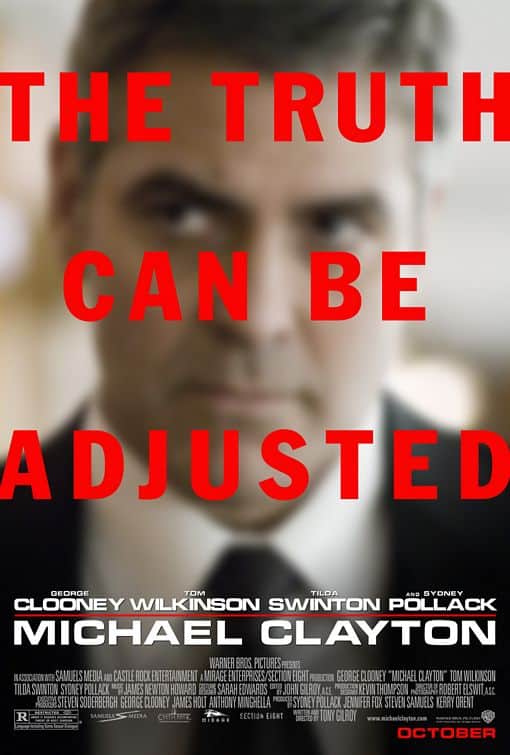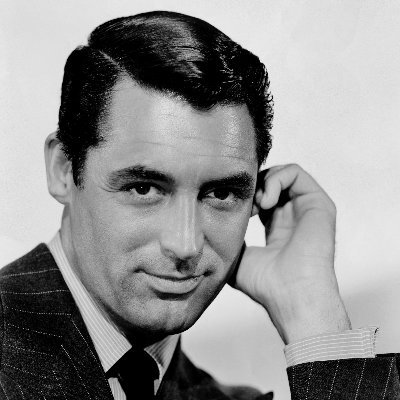
- Starring
- George Clooney, Tom Wilkinson, Tilda Swinton
- Writer
- Tony Gilroy
- Director
- Tony Gilroy
- Rating
- R (United States)
- Running Time
- 119 minutes
Overall Score
Rating Summary
Michael Clayton follows Michael Clayton (Clooney), an attorney and “fixer” for a prestigious law firm in New York City who uses his connections and knowledge of legal loopholes to benefit his clients. He has to deal with the mental breakdown of his colleague Arthur Edens (Wilkinson) and the intriguing corruption surrounding a major client of his law firm being sued in a class action case over the effects of toxic agrochemicals used by U-North, an agricultural products conglomerate. This also puts him in the crossfires of U-North’s ruthless general counsel Karen Crowder (Swinton).
The most clever idea Michael Clayton has up its sleeve is showing us the situation in the moment, then taking us way back to the start, tracing the steps that led the way to the present. This allows viewers to understand the title character a bit more without overexposing his work ethic; being the “fixer” means working in the shadows, cleaning up messes, and being a realist. Clayton doesn’t sugarcoat anything, nor does he give his clients any fantasies. He sees himself as a janitor, not a miracle worker.
Secondly, the structure gives us a glimpse into the “big bad” of the movie: U-North, which as we see, believes that money is more important than human lives. Of course, it’s more complicated than the term “big bad” would imply; for all intents and purposes, there are human beings running this corporations, including Crowder. She is manifest excellent at her job, seems to have a similar MO as Clayton, and certainly the same sleek, almost mechanical articulation and razor-like efficiency. The big difference is that she’s barely holding it together, a tight bundle of frayed nerves ready to fall apart everywhere at just the wrong moment.
The best evidence of this was in an early scene of her sweating profusely in a bathroom stall. These little details humanize the villain in a movie that hinges so much on the mystery of the case at its center. This says nothing about the schizophrenic Edens; this corporation is in legal trouble, being sued for billions, being paid billions to run in defense, and he now holds the smoking gun as an almost plot device, but much more than just passively serving the movie; you can palpably feel the comradery and history between him and Clayton, and the concern Clayton consistently shows for him feels genuine. If the way he’s executed and it’s covered up isn’t reminiscent of what big corporations will do to avoid accountability in real life, than who knows what is?
Clooney does a good job guiding viewers through the mystery while desperately trying to parse through it himself; his titular character is slick, well-dressed, intelligent, cunning, and knows what to say, how to say it, what to do, and just how to do it. But he doesn’t have all the answers, and letting his guard down for even just a moment can spell disaster in the scenario he’s in. Wilkinson is manic but not too overly so; he conveys the struggle of having a mental illness and it doesn’t feel put on at any point. He is also believable as a longtime friend and working partner of Clayton’s. Swinton shows the over-tightened control of being a nervous wreck trying her best to hold it together and keep doing what everyone says she’s great at. She is also utterly ruthless and cares only about keeping herself and her position afloat, as one would expect from someone entrapped in this cold corporate world. Sydney Pollack plays Marty Bach, a co-worker of Michael Clayton’s at the head of their law firm, giving a whip-smart, knowing and authoritative performance. The casting is actually incredibly crucial; have the wrong actors in these roles, and you could lose all sense of tension and energy. This extends to even other contributions from character actors like Michael O’Keefe as Barry Grissom.
It cannot be stressed enough how important the energy and tension is in a legal thriller. It’s the appeal of a genre that was given a level of vitality by figures like Michael Douglas and Josh Grisham. In order to achieve just that right balance, a film needs good pacing. Writer/director Tony Gilroy understands this. Under his eye, viewers almost want to dive into Michael Clayton‘s world of rapid-fire intelligent-sounding dialogue, sleek outfits, the constant work, and the nervous energy. At times it feels like the bathroom is the only safe haven and yet something about this feels appealing under a certain mindset. Gilroy is also smart to make sure the subplots of the characters never get too much focus and bog down the focus of the story. They merely serve to flesh out the characters and don’t make the story tedious. John Gilroy’s editing also does a lot to smooth out the tone and pacing, keeping the audience nervous and anticipatory at every angle.
In the end, Michael Clayton is a film that doesn’t sink under an attempt at social commentary, and instead succeeds as a great exercise in the legal thriller genre. Like Frankenheimer’s The Manchurian Candidate before it, this movie keeps you on-and-off edge, on your toes, and keeps you invested in his clinical mystery.
still courtesy of Warner Bros. Pictures
Follow me on Twitter, Instagram, and Letterboxd.
If you liked this, please read our other reviews here and don’t forget to follow us on Twitter or Instagram or like us on Facebook.
Discover more from
Subscribe to get the latest posts sent to your email.

